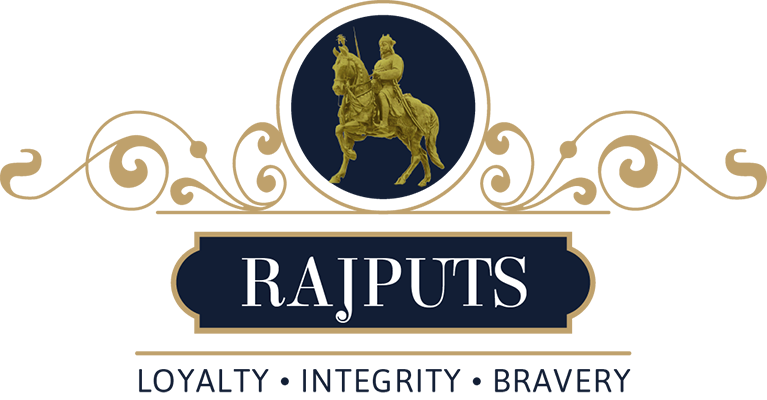- Thakur:
- is an Indian feudal title in several Indian languages, literally meaning “lord”. In Rajasthan, the title Thakur is usually adopted by Kshatriyas such as Rajputs. Thakur also conveys a designation meaning he is the head of the family and no one is above him. Son of Thakur is known as ‘Kunwar’, grandson as ‘Bhanwar’ and great-grandson as ‘Chel bhanwar’. Thakur is the one whose father has died. ‘Kunwar’ is the one who has his father alive and ‘Bhanwar’ is the one who has his grandfather alive and so on.
- Thikana:
- A Thikana is the state or (more often) estate of a Thakur.
- Kunwar:
- Son (Kunwarani if Daughter) of Thakur is known as Kunwar.
- Bhanwar:
- Grandson (Bhanwarani if Grand-daughter) of Thakur is known as Bhanwar.
- Zamindar:
- A zamindar or zemindar was an aristocrat, typically hereditary, who held enormous tracts of land and held control over his peasants, from whom the zamindars reserved the right to collect tax (often for military purposes). Over time, they took princely and royal titles such as Maharaja (Great King), Raja (King) and many others. Often zamindars were Indian princes who lost their sovereignty due to British Rule.
- Jagir:
- A jagir was a type of feudal land grant in South Asia bestowed by a monarch to a Sardar (Minister/Count) in recognition of his loyal service to the Crown. A jagir was technically a feudal life estate, as the grant lawfully reverted back to the monarch on death. However, in practice, many jagirs became hereditary by primogeniture. The recipient of the jagir (termed a jagirdar) was the de facto ruler of the territory and was able to earn income from taxes. The jagirdar would typically reside at the capital to serve as a Minister, typically appearing twice a day before the monarch. This feudal system of land ownership is referred to as the jagirdar system. It was first established in the 13th century by the Sultans of Delhi, was later adopted by the Maratha Empire in the early 17th century, and continued under the British East India Company. Following independence from the British Crown, the jagirdar system was abolished by the Indian government in 1951.
- Princely State:
- A Princely State (also called Native State or Indian State) was a nominally sovereign[1] entity of the British Indian Empire that was not directly governed by the British, but rather by an Indian ruler under a form of indirect rule, subject to a subsidiary alliance and the suzerainty or paramountcy of the British crown.A Princely State (also called Native State or Indian State) was a nominally sovereign entity of the British Indian Empire that was not directly governed by the British, but rather by an Indian ruler under a form of indirect rule, subject to a subsidiary alliance and the suzerainty or paramountcy of the British crown.
- Taluq/Tehsil:
- A tehsil (tahsil, tahasil) also known as taluk (taluq, taluka), and mandal, is an administrative division of some countries of South Asia.
- Taluqdar:
- A taluqdar or talukdar, is a term used for Indian land holders in Mughal and British times, responsible for collecting taxes from a district. In Rajastan and Bengal, a taluqdar was next only to a Raja in extent of land control and social status.
- Istimrari:
- The Istimrari estates were small feudal states (originally jagirs) in the 17th and 18th century Rajputana, the pre-1949 name of the present-day Indian state of Rajasthan, the largest state of the Republic of India. The Istimrari chieftains paid tribute to their masters but were not compelled to participate in wars unless called upon by their respective chiefs. In the Indian feudal system of 17th and 18th century, there were 66 Istimararis in the Rajputana (North west India). The Istimrari estates were originally only Jagirs, held under obligation of military service.
- Pana or Panna:
- Is a division of a family which has its own family head or Thakur. Pana's are usually created between brothers and each of them has their own estate.
- Gaddi:
- Is the head seat of a Province which is held by head of the family or the Thakur.
- Privy Purse:
- In India, the Privy Purse was a payment made to the royal families of erstwhile princely states as part of their agreements to first integrate with India in 1947, and later to merge their states in 1949 whereby they lost all ruling rights. The Privy Purse was continued to the royal families until the 26th Constitutional Amendment of 1971. (Wikipedia)
- Court of Wards:
- Ward is a person (usually a minor Prince) who has a guardian appointed by the court to care for and take responsibility for that person. The province comes under the management of Court of Wards.
Abbreviations
- qv:
- Stands for the Latin phrase Quod Vide which means see this as well. It is used to direct a reader to another part of a article for further information. (Wiktionary)
- née:
- Originally or formerly called. Used to identify a woman by her maiden family name. (Wikipedia)
- s.p.m/spm/dspm
- Derived from Latin phrase decessit sine prole mascula, used in genealogical records, often in the abbreviated form dspm or spm, to indicate a person who died without having had any male children who lived or outlived them.
- GOI
- Government of India
- MLA
- A Member of Legislative Assembly or MLA is a representative elected by the voters of an electoral district to the Legislature of a State of India.
